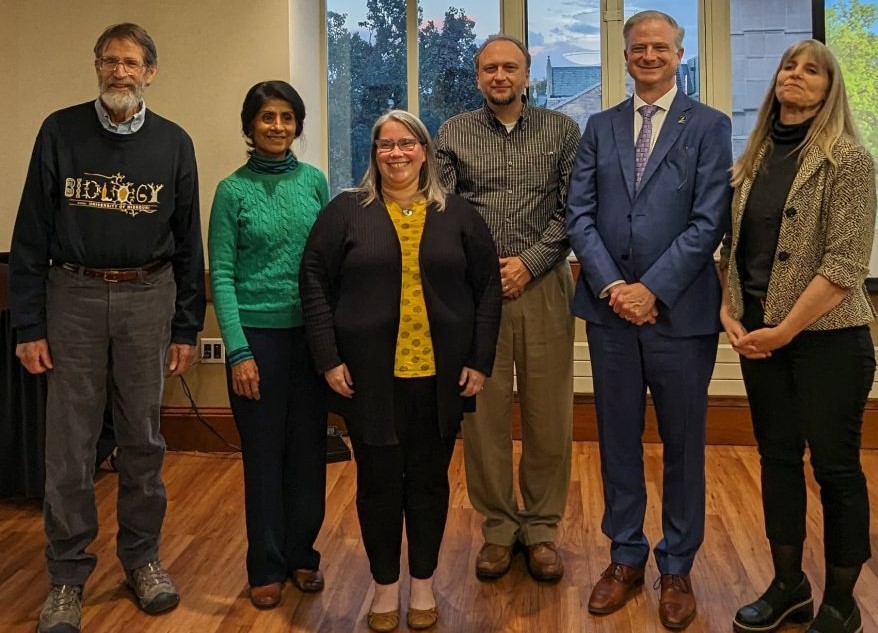Published on Oct. 26, 2023
Updated on Oct. 31, 2023

This past week, we honored our 2023 Maxine Christopher Shutz Award recipient: Dr. Pamela Brown, Associate Professor of Biological Sciences at MU. The Shutz Lecture is made possible by the generosity of Mrs. Maxine Christopher, the first woman appointed to the University of Missouri System Board of Curators (1953-1959). She was a 1923 graduate of the University with a Bachelor of Arts degree.
This award is unique for multiple reasons. First, the purpose of the award is to recognize a faculty member who has demonstrated efforts to involve undergraduates in active learning experiences. Second, the presentation of the award is followed by a lecture by the recipient, an experience that enables the campus community to learn about the recipient and their work. Dr. Brown’s lecture was a learning experience for all who attended.
At a time when the value of an undergraduate degree is being questioned, Dr. Brown’s work reminded us that the learning environment we create in our classrooms can result in life transforming experiences for students that will continue beyond the course, the program and the degree. And it all starts with a faculty member who cares.
Dr. Brown spoke of her journey from a small town in New England to the University of Connecticut where she was fortunate to be in classrooms where the faculty member focused on teaching, but more importantly on making sure that she understood what it means to be a scientist, ultimately inspiring her to pursue a career in research rather than medicine. She decided to go to graduate school and earned a PhD in Microbiology so she could continue to do what she had learned to love about research.
Dr. Brown is now paying this forward in her classrooms where her students often come from rural Missouri and may not have experienced the joys of research. To serve them, she uses the Course-based Undergraduate Research Experience (CURE) program where students are exposed to research via hands-on learning experiences, all within their credit bearing course. CUREs have been shown to benefit students by improving their learning and scientific skills while also giving them the confidence to work with faculty and explore original research questions. These experiences are of particular significance to students who are the first in their families to attend college, and those who come from underserved communities. Additionally, such participation has been shown to reduce a student’s time to graduation. While research-based courses tend to be offered to seniors, CUREs can be offered to freshmen as well – in fact, this is the recent focus of Dr. Brown’s work. From one section she has now grown her offering to three, with 67 Honors College students with majors in 4 different colleges! Clearly students are interested and have indicated a desire to participate.
A third of the students taking the CURE as juniors went on to pursue mentored research experiences, and some are currently in graduate school in diverse life science programs. Over the last two years, Dr. Brown has introduced changes to her course, so it focuses on research skills rather than discipline-specific knowledge. This makes it attractive to every student irrespective of their major. And her students have noticed and are grateful. As one student described in Dr. Brown’s nomination package: “ [Dr. Brown’s] consistent drive to do the best for her students and help them reach their own personal goals distinguishes her from the typical professor and mentor. She is not a one size fits all teacher or mentor and strives to meet students where they are and guide the individual to the best of her abilities.”
While Dr. Brown has focused on research questions related to antibiotic discovery (using the Tiny Earth model), she plans to work with campus partners to scale the course and offer it to more students and across all majors and at all levels from freshmen to seniors. And her students are clearly grateful – the expression on her students’ faces as they work in her lab (see picture above) says it all. Thank you, Dr. Brown, for teaching us that a researcher’s joy of discovery can be converted into transformative learning opportunities for all our students, across all majors, and across all levels, from freshmen to seniors.
And her students are clearly grateful – the expression on her students’ faces as they work in her lab says it all. Thank you, Dr. Brown, for teaching us that a researcher’s joy of discovery can be converted into transformative learning opportunities for all our students, across all majors, and across all levels, from freshmen to senior, and beyond.
Read more about the award from Biological Sciences.